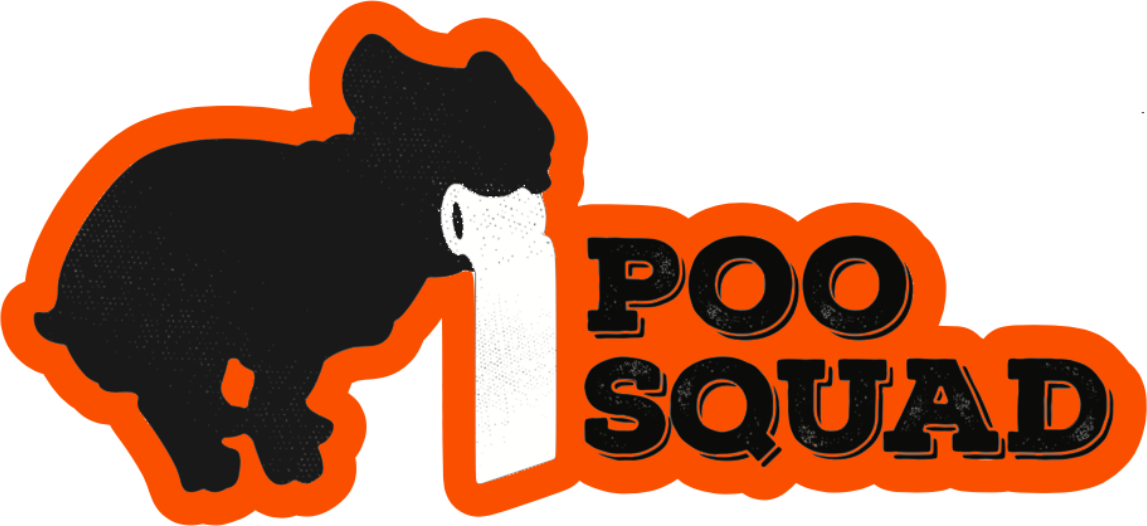Dog poop in your yard spreads bacteria, damages grass, and attracts pests. Clean it promptly using gloves, bags, and safe disposal. Prevent recurrence with pet training, barriers, or regular scooping services. Left unchecked, it poses serious health and environmental risks.
- Fresh feces can contain E. coli, Salmonella, and over 23 million bacteria per gram.
- Parasites like Giardia and roundworms can survive in soil for weeks or months.
- Rain spreads contaminants into groundwater and nearby lawns.
- Lawn damage occurs due to nitrogen overload, leading to “burnt” grass patches.
- Flies, rodents, and insects are drawn to unattended waste, escalating pest issues.
Dog poop in your yard does more than cause bad smells. It damages your lawn, spreads harmful bacteria, and increases health risks for both people and pets. Whether it’s from your dog or a surprise left by a neighbor, the problem adds up quickly, especially if it keeps happening.
Many homeowners assume the waste will wash away or break down on its own. It doesn’t. Dog feces contains over 23 million bacteria per gram, along with parasites like roundworms and Giardia that remain in the soil long after the pile disappears. Add rain, lawnmowers, or foot traffic, and those pathogens spread even further.
- Mowing over dog waste aerosolizes bacteria and spreads it across your lawn.
- Barefoot children or pets playing outside face a higher risk of infection.
- Soil contamination can linger and require reseeding or treatment to recover.
How to safely clean up dog waste, how to prevent future messes, and why regular removal matters more than most people think. Whether you’re dealing with your own pet’s habits or unwanted visitors, here’s how to reclaim your lawn, protect your family, and keep the problem from returning.
Why Dog Poop in Your Yard Is a Serious Problem
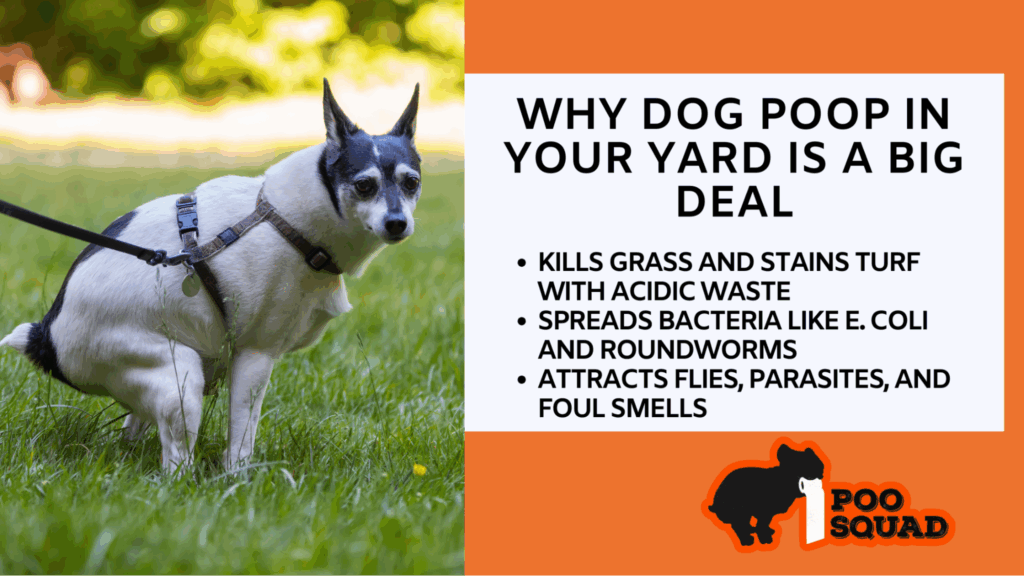
Leaving dog poop in your yard does more than make your lawn look bad. It spreads harmful bacteria, damages your grass, and creates health risks for kids, pets, and anyone who steps outside. The longer it sits, the more problems it causes, physically, environmentally, and socially.
Many people assume dog waste breaks down like cow manure. But unlike farm fertilizer, dog poop is highly acidic, packed with protein byproducts, and often loaded with parasites. It doesn’t help your yard, it harms it.
- That lingering patch of dead grass? Probably not your sprinklers — more likely toxic ammonia and bacteria.
- Rain doesn’t wash it away; it spreads bacteria like E. coli and roundworms into storm drains.
- Cities may fine homeowners for uncollected pet waste due to its environmental impact.
And if you’ve got kids playing in the backyard?
This matters even more. One wrong step, one playful hand in the dirt, and now the germs are inside. Our team has met dozens of parents who didn’t realize how serious this was until it affected their child’s health or their dog’s behavior.
We’ve even heard stories from families who stopped using their yards altogether until they found us. With our sanitization and deodorizer services, we clean the surface and kill the odor-causing bacteria, leaving behind a lawn that’s safe to use again.
Health Hazards Lurking in Dog Waste
Dog poop is not only an outdoor annoyance, it’s a health hazard hiding in plain sight. Packed with parasites, viruses, and bacteria, it puts your family, your pets, and even your neighbors at risk. That mess in the grass might carry far more than a foul smell.
Every scoop you skip opens the door to potential illness. Dog waste is a known carrier of hookworms, roundworms, and giardia, parasites that can infect both animals and humans. For children who play outside, the risk is even higher. Parasite eggs can linger in the soil for months, long after the poop has vanished from sight.
- Parasite eggs (like roundworms) can survive in soil for weeks or months.
- Giardia transmission can occur through contaminated hands, paws, or shoes.
- Children face greater exposure risks due to hand-to-mouth contact while playing.
Viral threats like parvovirus are also shed in dog feces and can survive in your yard for extended periods. Unvaccinated pets are especially vulnerable, and once an outbreak starts, it’s tough to stop. We’ve seen families lose weeks to expensive treatments simply because they didn’t realize the leftover waste was the source.
Our service exists to stop those risks before they start. Every visit includes sanitized tools and footwear, reducing the chance of cross-contamination between yards. We’ve even had customers tell us they discovered health issues early thanks to our dog poop report card, which flags anything unusual we see during our visit.
DIY Cleanup: How to Safely Remove Dog Poop from Your Yard
If you’re doing the cleanup yourself, how you handle dog waste matters just as much as how often. Using the right tools and disposal methods protects your lawn, your health, and your weekends. A few smart upgrades can make the gross job a little less awful.
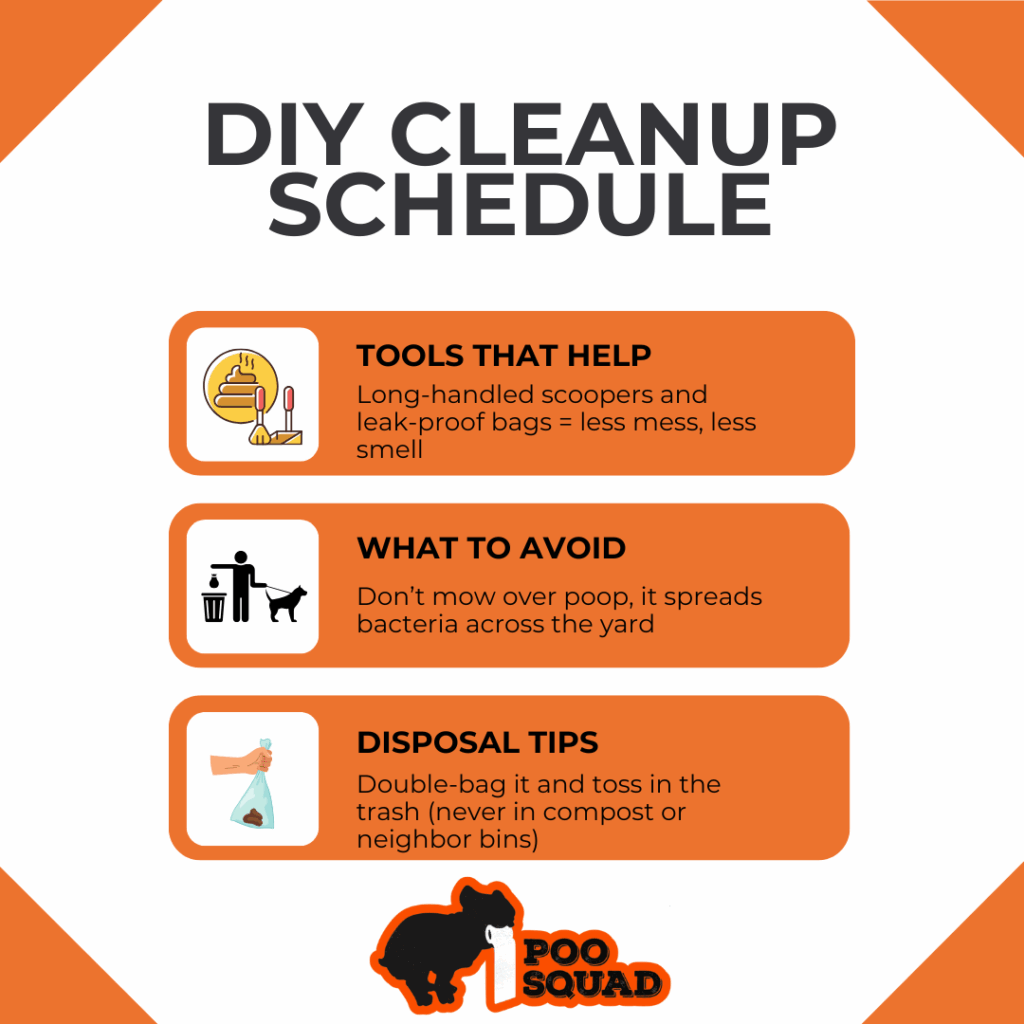
Best Tools for the Job
You don’t need much, but a good setup makes a difference. Long-handled scoops save your back. Durable waste bags with tight seals keep smells and bacteria out. Buckets with liners are great for multi-dog households or yards that get scooped less frequently.
And whatever you do, don’t run over it with your mower. That turns the problem into a fine mist of pathogens spread across your yard. Yes, we’ve heard people do this. No, it doesn’t help.
We recommend setting a consistent schedule, especially if you’re managing poop through the colder months when days are shorter. Most of our weekly service customers sign up because they’re tired of dealing with a weekend pile-up after long workweeks.
Smart Disposal: What to Do with the Waste
Once it’s bagged, where should it go? Here’s a breakdown:
- Trash Bin: Most cities allow double-bagged waste in your household trash. Always check local rules.
- Waste Digesters: In-ground digesters can work if installed correctly and maintained, but they’re not for everyone.
- Flushing: Some municipalities allow flushing dog poop, but never with bags or in homes with septic systems.
- Composting: Technically possible with heat-treated compost systems, but never use composted dog poop on edible plants.
And don’t dump it in a neighbor’s trash bin. It might feel like a harmless shortcut, but we’ve seen more yard feuds start over that than you’d believe.
When It’s Not Your Dog: Dealing With Neighborly Offenders
Nothing’s more frustrating than cleaning up after someone else’s dog. Whether it’s the neighbor next door or a stray on the loose, uninvited waste can turn a peaceful yard into a personal battleground. The solution takes equal parts tact, strategy, and prevention.
If you’re seeing mystery piles and you don’t own a dog, the instinct is to confront someone. But unless you’ve got clear evidence (and a calm tone), that can go sideways fast. We’ve heard from plenty of customers who tried returning poop to the offending yard, only to escalate the tension.
- Motion-activated sprinklers and posted signs help deter repeat offenders.
- Odor deterrent sprays along fence lines can disrupt a dog’s scent trail.
- Dogs often return to the same spot unless redirected.
If confrontation becomes necessary, take the friendly route. Document the issue with timestamps or even videos if needed. Then approach the owner directly or notify your HOA if applicable. Many folks don’t realize their dog roams or that it’s become a problem.
Meanwhile, our commercial scooping services can be a game-changer for neighborhoods, HOAs, and shared yards. We’ve been brought in before as neutral ground, removing the mess while defusing the drama.
Preventing Future Poop Problems in Your Yard
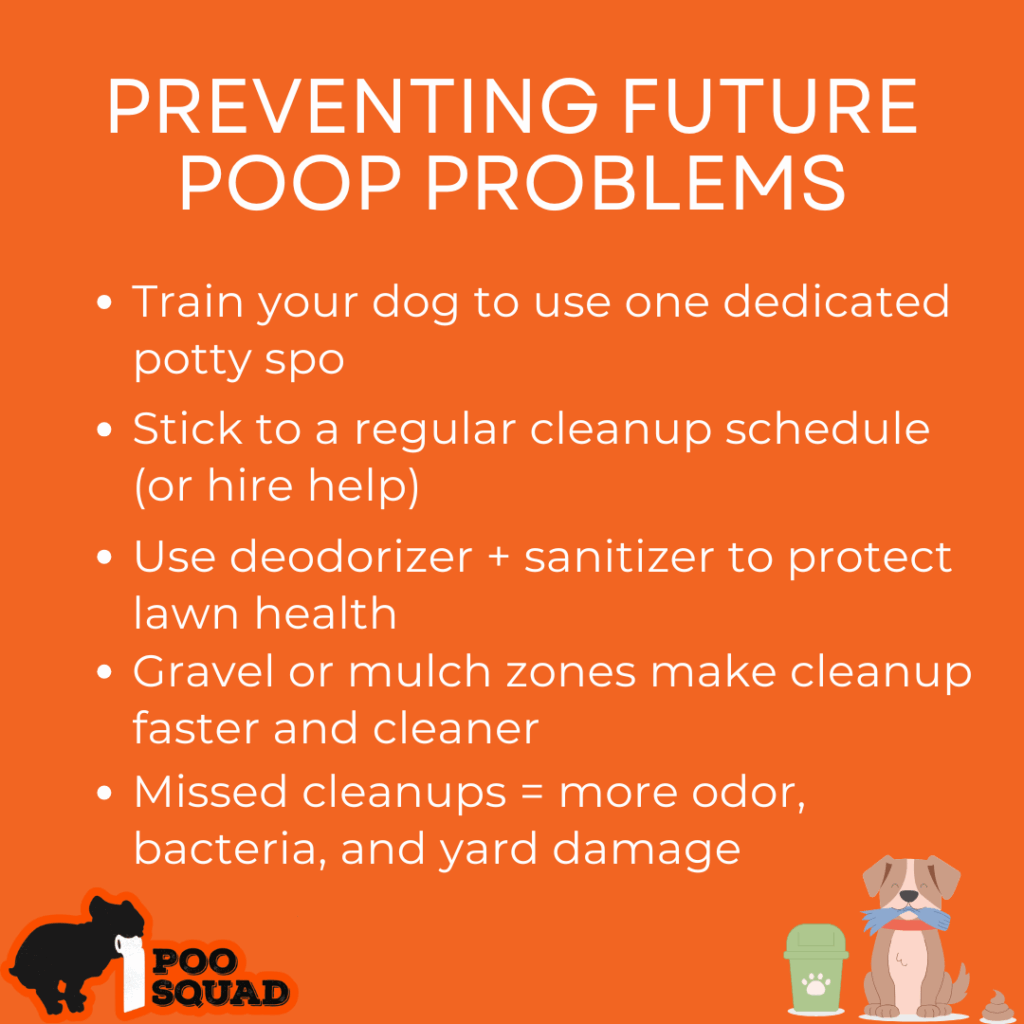
The best way to deal with dog poop is to stop it from piling up in the first place. With the right habits, yard setup, and support, you can reclaim your lawn as a clean, safe space, without spending every Saturday in gloves and boots.
Training Your Own Dog to Go in One Spot
Start by picking a low-traffic corner of your yard. Use verbal commands, consistency, and positive reinforcement to guide your dog to the same location each time. A gravel patch, mulch bed, or fenced potty zone helps reinforce boundaries and makes clean-up easier and faster.
Dogs thrive on routine, and once they associate one spot with doing their business, they’re more likely to stick to it. This also prevents random “landmines” across your yard, especially helpful for families with kids or frequent backyard hangouts.
Yard Maintenance That Keeps Poop at Bay
Regular cleanup keeps things under control, but even better is a routine that includes professional backup. Skipping a week or two can mean hidden waste, stronger odors, and a higher risk of cross-contamination, especially after rain.
That’s why our triple gate check guarantee and weekly reminders are so popular. We don’t just show up, we show up the same day each week, send a heads-up before arrival, and text you a photo of your closed gate when we leave. It’s full-circle peace of mind.
Want to go further?
Add sanitization and deodorizer treatments to kill bacteria and neutralize odor, especially helpful if you’re hosting guests, training a new puppy, or trying to reverse long-term yard damage.
Can Dog Poop Be Used as Fertilizer?
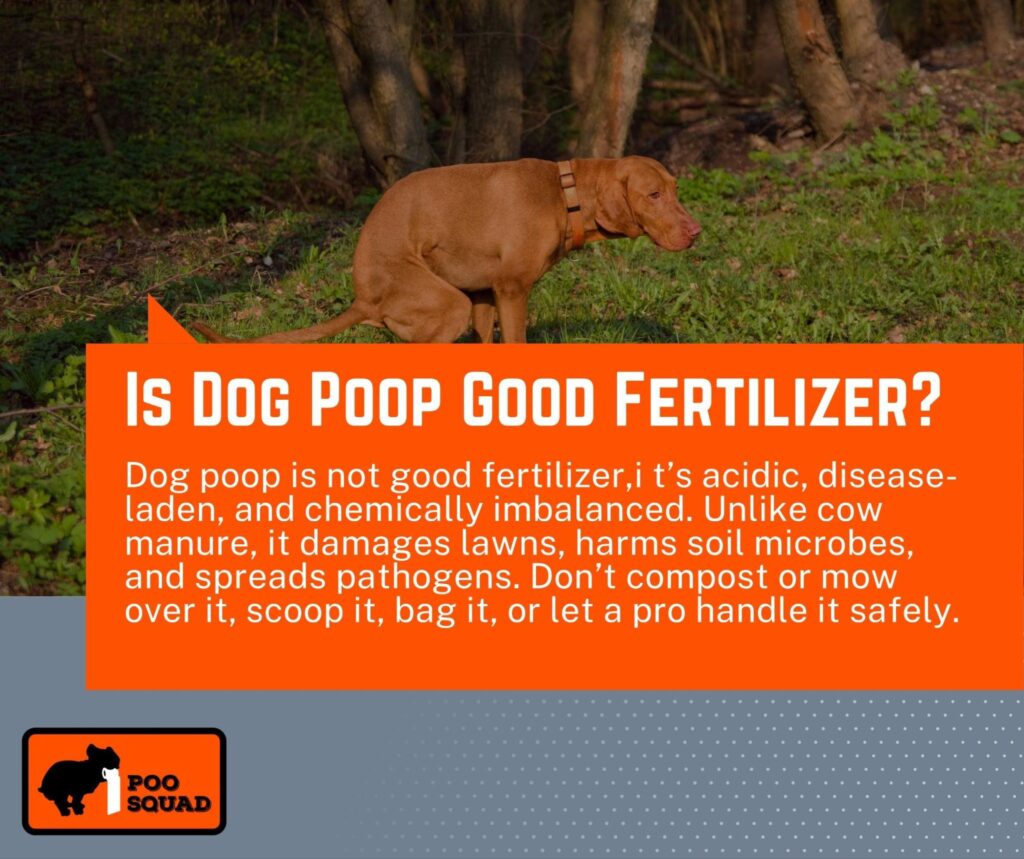
It might seem like a natural shortcut, leave the poop, let it decompose, and call it compost. But dog waste doesn’t enrich your soil. It poisons it. What works for cows and chickens doesn’t apply to meat-eating dogs and the bacteria they leave behind.
- Dog poop is high in nitrogen and low in beneficial bacteria.
- Leftover piles often cause yellow or dead patches on the grass.
- Soil contamination lingers long after the poop disappears.
Technically, composting dog waste is possible, but it requires extreme heat and a setup that separates pet waste from anything used on edible plants. Most backyard compost bins don’t reach the temperatures needed to neutralize bacteria and parasite eggs.
- Waste digesters can help, but require maintenance and are regulated by local laws.
- Tossing bagged poop into the woods is not eco-friendly, it spreads bacteria into waterways.
This kind of confusion is exactly why our dog poop report card matters so much. If your dog’s waste is too soft, oddly colored, or showing signs of infection, our team flags it discreetly, so you know when something’s off before it gets worse.
Why Professional Poop Removal Might Be Your Best Option
Picking up poop might not seem like a big deal until you’re behind on it, stressed about guests, or knee-deep in a winter pile-up. If you’re tired of the smell, the mess, and the chore itself, professional scooping turns the job into a non-issue.
Time is the biggest reason our customers call us.
They’re juggling work, kids, and life, and suddenly poop pickup becomes the last thing on a never-ending list. We take that weight off your shoulders. Literally.
But it’s not about convenience. Our residential pooper scooper service is built around trust. That means reminders at 8 am, a heads-up when we’re 10 minutes away, photos of your latched gate when we leave, and tools sanitized between every yard to prevent cross-contamination. It’s all designed for peace of mind.
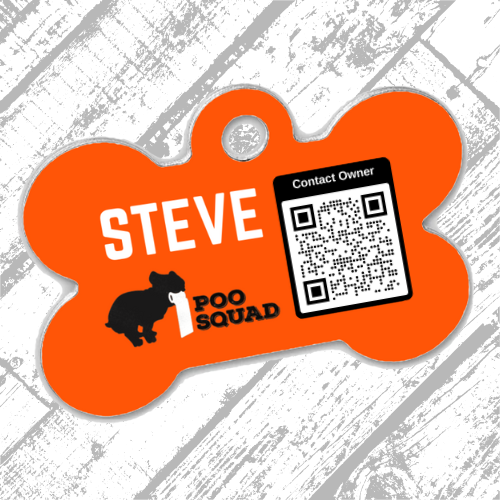
We wear bright orange so you know exactly who’s in your yard. We background-check every employee and verify their identity with QR-coded badges. We even offer a pet ID program with custom dog tags that help reunite lost pets with their owners in one scan.
Most of our customers started with a simple goal: “I don’t want to deal with this anymore.” What they found was a service that made their yard feel clean, safe, and usable again.
What To Do Next If You’re Overwhelmed
If dog poop has taken over your yard, and your patience, it’s time for a better solution. Whether you’re dealing with a mess from your pup or a neighbor’s, you don’t have to live with it. Clean yards, healthy pets, and a stress-free routine are all possible.
Start by cleaning what’s already there using safe disposal methods and basic gear. If that sounds like more than you want to handle, we’ve got your back.
Our team shows up on time, handles the mess, and leaves your yard cleaner than we found it, every time.
Consider adding yard sanitization and deodorizing for a fresh start, or explore our commercial services if you manage multi-family properties, HOAs, or pet-friendly spaces.
Ready to stop scooping for good?
Schedule your first poop scooping service. You’ll get reminders, verified visits, and a clean yard, without lifting a finger.
We take a lot of crap from our customers, and we’re proud of it.
